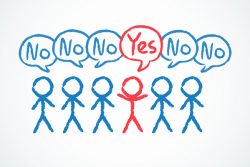Group Climate
Group climate is the emotional atmosphere, the enveloping tone that is created by the way we communicate in groups.
A positive climate exists when individuals perceive that they are valued, supported, and treated will by the group.
A negative climate exists when group members do not feel valued, supported, and respected, when trust is minimal, and when members perceive that they are not treated well.
Competition: Winner Takes All
- Competition is a mutually exclusive goal attained (MEGA) process.

- When transactions in groups are competitive, individual success is achieved at the expense of other group members.
- Competition, by definition, necessitates the failure of the many of the success of the few.
Cooperation: Winners All
- Cooperation is a mutually inclusive attainment (MIGA) process.
- Individual success is tied directly to the success of other group members.
- Group members work together, not against each other, when attempting to achieve a common goal.
Hyper-competitiveness:Winning is Everything
Hyper-competitiveness- The excessive emphasis on defeating others to achieve one’s goals.
defeating others to achieve one’s goals.
- It is hyper-competitiveness, not competitiveness itself, that poses the greatest challenge to establishing a positive group climate of trust, openness, directness, supportiveness, and accomplishment.
- Constructive competition occurs when competition produces a positive, enjoyable experience and generates increased efforts to achieve without jeopardizing positive interpersonal relationships and personal well-being.
When Winning is Relatively Unimportant
- The less group members emphasize wining as the primary goal of competition and instead focus more on having fun and developing skills while competing, the more positive will be the group climate.
- When opponents are equally matched, allowing all participants a reasonable chance to win.
- When there are clear, specific rules that ensure fairness. When there are clear rules enforced without bias, competition can be a constructive enterprise. When there are no rules, or rules are enforced selectively or haphazardly, competition induces strong dissatisfaction with remaining a member of a group.
All three of the above conditions must be satisfied for constructive competition to occur.
Competition and Communication Competence: Can Me Be We?
- Communication competence is a matter of degree.
- Although competent communication requires We-orientation, this does not exclude any consideration of individual needs. Orientation implies primary, not exclusive, focus. The emphasis matters, not the mere presence of occasional competitive, individualistic communication patterns.
- Many activities combine both competition and cooperation. Inter-group (between groups) competition usually requires a great deal of intra-group (within a group) cooperation.
Group Productivity: Achievement and Performance on Tasks
The cooperation advantage is especially significant when compared to the disadvantages of competition that is hyper-competitive, between unequal opponents, and conducted unfairly.
There are two primary reasons why cooperation promotes and competition dampens achievement and performance for most groups and individuals.
- Attempting to achieve excellence and trying to beat others are different goals.
- Resources are used more efficiently in a cooperative climate.
A cooperative climate promotes the full utilization of information by a group, whereas a competitive climate typically promotes information hoarding.
Categorised in: General
This post was written by
Please Subscribe and get Notified when new articles are posted
